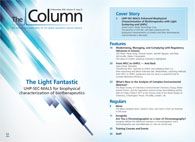Rudolf Krska Receives B.R.A.I.N Award
Rudolf Krska of the University of Natural Resources and Life Sciences (BOKU), in Vienna, Austria, has been awarded the biennial B.R.A.I.N award at the Biomin scientific conference held in Vancouver, Canada.
Rudolf Krska of the University of Natural Resources and Life Sciences (BOKU), in Vienna, Austria, has been awarded the biennial B.R.A.I.N award at the Biomin scientific conference held in Vancouver, Canada.
As of 2013, Krska is the most-cited author on the topic of mycotoxins in the past decade, and this enormous contribution was highlighted as a key reason for Krska winning the award by the selection committee.
“Dr. Krska is a high flier in the field of mycotoxins who is well-recognized for his expertise by his peers,” said Eva Maria Binder, Chief Research Officer at the Erber Group.
Further to Krska’s ongoing work as a research scientist, his 20+ year track record of working with the Biomin Research Centre, part of the Erber Group, on numerous projects also contributed to him receiving the honour.
Biomin Founder and President of the Supervisory Board of Erber Group, Erich Erber, remarked that Rudolf Krska “is one of the most outstanding scientists I have come across in
my life. When we met [for the] first time in 1994 to discuss a common project on mycotoxins we could not imagine
where we stand today.”
Krska received his award on the final day of the scientific conference at the 2016 World Nutrition Forum, which included the B.R.A.I.N trophy and a check for $10,000.

Assessing Safety of Medications During Pregnancy and Breastfeeding with LC–MS/MS
Published: April 8th 2025 | Updated: April 8th 2025Researchers conducted a study on medications used in psychiatry and neurology during the perinatal period, assessing how antiepileptic drugs (AEDs) affect placental functions, including transport mechanisms, nutrient transport, and trophoblast differentiation. Several quantitative methods, such as those for antianxiety and hypnotic drugs, were established to evaluate the safety of pharmacotherapy during breastfeeding using liquid chromatography-tandem mass spectrometry (LC–MS/MS).










